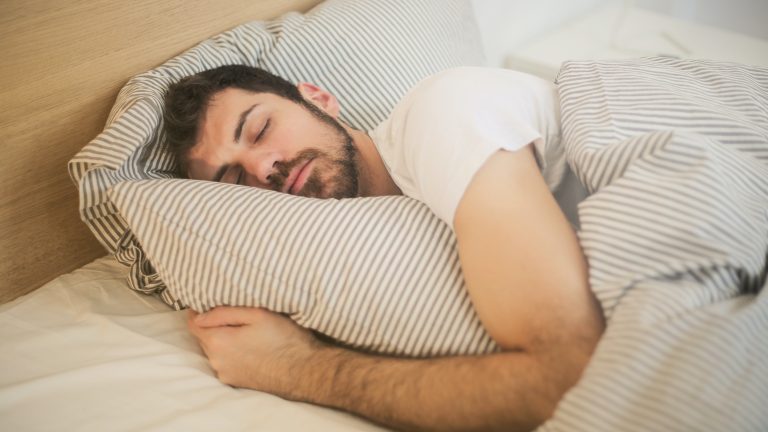- Introduction
- The Basics of Sleep and Testosterone
- The Role of Sleep in Testosterone Production
- Sleep Disorders and Testosterone
- Lifestyle Factors That Affect Sleep and Testosterone
- Strategies to Improve Sleep and Boost Testosterone
- Conclusion
- FAQ Section
- Question: Does low testosterone affect sleep?
- Question: Does high testosterone affect sleep?
- Question: Does testosterone replacement therapy affect sleep?
- Question: Does sleep affect testosterone?
- Question: Does sleep apnea affect testosterone?
- Question: Does sleeping more increase testosterone?
- Question: How can I increase testosterone naturally?
Introduction
Testosterone is a vital hormone for men, responsible for a range of important bodily functions, including the development of muscle mass, bone density, and sex drive. However, recent research has shown that there may be a surprising link between sleep and testosterone levels. In this article, we will explore this connection in depth, examining the science behind testosterone production, the impact of sleep quality and duration on testosterone levels, and lifestyle factors that can affect both sleep and testosterone. Finally, we will provide practical strategies for improving sleep and boosting testosterone, as well as answer some common questions about this topic.
The Basics of Sleep and Testosterone
Before we dive into the connection between sleep and testosterone, it’s important to first understand the basics of each.
What is Testosterone?
Testosterone is a hormone that is primarily produced in the testes of men (and to a lesser extent in women’s ovaries). It plays a crucial role in a wide range of bodily functions, including the development of male reproductive organs, muscle and bone mass, and sex drive. Testosterone production is regulated by the hypothalamus and pituitary gland in the brain.
What Happens When You Sleep?
Sleep is a complex biological process that is vital for overall health and well-being. During sleep, your body undergoes a range of important processes, including tissue repair, memory consolidation, and hormone regulation. Sleep is divided into several stages, including rapid eye movement (REM) sleep and non-REM sleep.
How Testosterone Production Works
Testosterone production is regulated by the hypothalamus-pituitary-gonadal (HPG) axis. The hypothalamus releases gonadotropin-releasing hormone (GnRH), which stimulates the pituitary gland to release luteinizing hormone (LH) and follicle-stimulating hormone (FSH). LH then stimulates the Leydig cells in the testes to produce testosterone. Testosterone levels fluctuate throughout the day, with the highest levels occurring in the morning.
The Role of Sleep in Testosterone Production
Now that we’ve covered the basics of sleep and testosterone, let’s explore the connection between the two in more detail.
The Science of Sleep and Testosterone
Research has shown that sleep plays a crucial role in testosterone production. During sleep, testosterone production is at its highest, with levels increasing during REM sleep in particular. This is because the body’s internal clock, or circadian rhythm, regulates testosterone production, and sleep is an important part of this process.
How Sleep Quality Affects Testosterone Production
Studies have also shown that sleep quality can have a significant impact on testosterone production. In particular, poor sleep quality, characterized by frequent awakenings and disturbances, has been linked to lower testosterone levels. This is thought to be because disruptions to sleep can disrupt the body’s internal clock and interfere with the production of hormones like testosterone.
However, the results may vary depending on the individual’s condition, goals, dosage, type and frequency of administration, and other factors. Some of the studies are:
- A 2011 study on the effects of sleep restriction on testosterone levels in healthy young men found that “men who slept less than 5 hours a night for one week had significantly lower levels of testosterone than when they had a full night’s rest— a 10 to 15 percent decrease in testosterone production on average.”
- A 2019 study on the effects of sleep deprivation on testosterone levels in healthy older men found that “sleep deprivation (4 hours/night) for 5 nights resulted in a significant decrease in total testosterone levels (−10.4%; P < .001) and free testosterone levels (−15.4%; P < .001) compared with baseline values.”
- A 2020 study on the effects of sleep quality and duration on testosterone levels in healthy young men found that “poor sleep quality was associated with lower morning total testosterone levels (P = .02), but not with evening total testosterone levels (P = .14). Sleep duration was not associated with either morning or evening total testosterone levels (P > .05).”
These studies suggest that sleep quality and duration can affect testosterone production and levels in men. Poor sleep quality or insufficient sleep can result in lower testosterone levels, which can have various consequences for health and well-being. Getting enough quality sleep can help maintain normal testosterone levels and support various body functions.
How Sleep Duration Affects Testosterone Production
In addition to sleep quality, sleep duration is also important for testosterone production. Studies have shown that men who sleep less than five hours per night have significantly lower testosterone levels than those who sleep for seven to eight hours per night. This is because testosterone production is highest during the first few hours of sleep, so getting enough sleep is crucial for maintaining healthy testosterone levels.
Sleep Disorders and Testosterone
Sleep disorders can have a significant impact on both sleep quality and testosterone production. Here are some of the most common sleep disorders and their effects on testosterone:
Sleep Apnea and Testosterone
Sleep apnea is a condition characterized by interruptions to breathing during sleep. Research has shown that sleep apnea is associated with lower testosterone levels in men, likely due to the disruption of sleep and the subsequent impact on testosterone production.
Insomnia and Testosterone
Insomnia is a sleep disorder characterized by difficulty falling or staying asleep. Like sleep apnea, insomnia can disrupt sleep and interfere with testosterone production, leading to lower testosterone levels.
Other Sleep Disorders and Testosterone
Other sleep disorders, such as restless leg syndrome and narcolepsy, have also been linked to lower testosterone levels. While the exact mechanisms behind these associations are not yet fully understood, it is clear that sleep disorders can have a significant impact on testosterone production and overall health.
Lifestyle Factors That Affect Sleep and Testosterone
In addition to sleep disorders, several lifestyle factors can also impact both sleep and testosterone production. Here are some of the most significant:
Exercise and Testosterone
Regular exercise has been shown to increase testosterone levels in men, particularly resistance training. However, overtraining and excessive exercise can have the opposite effect, leading to lower testosterone levels. Additionally, exercise has also been shown to improve sleep quality, which can in turn improve testosterone production.
Diet and Testosterone
Diet can also play a role in testosterone production. Adequate intake of macronutrients like protein, fat, and carbohydrates is important, as is sufficient intake of micronutrients like zinc and vitamin D. In particular, low-fat diets and diets low in saturated fats have been linked to lower testosterone levels. Additionally, eating a large meal before bedtime can interfere with sleep quality and disrupt testosterone production.
Stress and Testosterone
Chronic stress can have a significant impact on both sleep and testosterone production. High levels of stress can disrupt the body’s natural rhythms and interfere with the production of hormones like testosterone. Additionally, stress can also lead to poor sleep quality, which can further exacerbate the issue.
Alcohol and Testosterone
Alcohol consumption can also impact testosterone production. While moderate alcohol consumption is not generally thought to have a significant impact on testosterone levels, excessive drinking can lead to lower testosterone levels in men. Additionally, alcohol consumption can interfere with sleep quality, leading to further disruption of testosterone production.
Caffeine and Testosterone
Caffeine is a stimulant that can interfere with sleep quality and disrupt the body’s natural rhythms. While caffeine consumption is not thought to have a direct impact on testosterone production, it can indirectly impact testosterone by interfering with sleep. Additionally, caffeine consumption can also increase levels of the stress hormone cortisol, which can further impact testosterone production.
Strategies to Improve Sleep and Boost Testosterone
Fortunately, there are several strategies that can help improve sleep quality and boost testosterone production. Here are some of the most effective:
Sleep Hygiene Tips
Sleep hygiene refers to the practices and habits that are conducive to good sleep quality. These can include things like sticking to a regular sleep schedule, creating a relaxing sleep environment, avoiding screens before bed, and limiting caffeine and alcohol intake. By implementing good sleep hygiene practices, you can help improve sleep quality and promote healthy testosterone production.
Natural Sleep Aids
There are also several natural sleep aids that can help improve sleep quality. These can include things like valerian root, melatonin, and chamomile tea. These natural remedies can help improve sleep quality without the risks of prescription sleep aids, which can be habit-forming and have unwanted side effects.
Testosterone-Boosting Supplements
In addition to improving sleep quality, there are also several supplements that can help boost testosterone production. These can include things like DHEA, zinc, and magnesium. However, it is important to consult with a healthcare provider before starting any new supplements to ensure their safety and effectiveness.
Hormone Replacement Therapy
For men with low testosterone levels, hormone replacement therapy (HRT) may be an effective treatment option. HRT involves replacing testosterone that is no longer being produced by the body, either through injections, patches, or gels. However, HRT is not without risks, and it is important to discuss the potential benefits and risks with a healthcare provider before starting treatment.
Conclusion
In summary, sleep and testosterone are closely interconnected, with sleep quality and duration having a significant impact on testosterone production in men. Sleep disorders, lifestyle factors, and other health conditions can also impact both sleep and testosterone production. However, there are several strategies that can help improve sleep quality and boost testosterone production, including good sleep hygiene practices, natural sleep aids, testosterone-boosting supplements, and hormone replacement therapy.
Prioritizing sleep is essential for overall health and wellness, and can have a significant impact on many aspects of our physical and mental health. By understanding the relationship between sleep and testosterone, and taking steps to improve our sleep habits and promote healthy testosterone production, we can improve our overall health and well-being.
FAQ Section
Question: Does low testosterone affect sleep?
Yes, low testosterone levels in men can lead to sleep disturbances such as insomnia, decreased sleep quality, and sleep apnea. This is because testosterone plays a role in regulating sleep patterns and promoting deep, restful sleep.
Question: Does high testosterone affect sleep?
While high testosterone levels are not directly linked to sleep disturbances, they can indirectly impact sleep if they cause anxiety or mood changes that make it difficult to fall asleep or stay asleep.
Question: Does testosterone replacement therapy affect sleep?
Testosterone replacement therapy (TRT) can improve sleep quality in men with low testosterone levels, as it helps to regulate the sleep cycle and promote deep, restful sleep. However, TRT can also have side effects that impact sleep, such as increasing the risk of sleep apnea.
Question: Does sleep affect testosterone?
Yes, sleep has a significant impact on testosterone production in men. Poor sleep quality and short sleep duration can lower testosterone levels, while adequate and restful sleep promotes healthy testosterone production.
Question: Does sleep apnea affect testosterone?
Yes, sleep apnea can lower testosterone levels in men. This is because sleep apnea disrupts the sleep cycle and can lead to decreased oxygen levels in the body, both of which can impact testosterone production.
Question: Does sleeping more increase testosterone?
While adequate sleep is important for healthy testosterone production, sleeping more than necessary does not necessarily increase testosterone levels beyond what is considered healthy or normal.
Question: How can I increase testosterone naturally?
There are several natural ways to increase testosterone levels, such as exercising regularly, eating a healthy diet that is rich in protein, healthy fats, and micronutrients like zinc and vitamin D, getting enough sleep, reducing stress, and taking natural supplements like Ashwagandha or fenugreek. However, it is important to talk to a healthcare provider before starting any new supplements or making significant lifestyle changes to ensure they are safe and effective for you.





